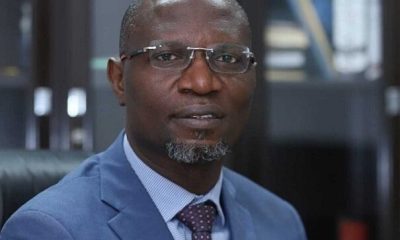Economy
CBN introduces electronic FX matching system for transactions

In a major shift aimed at reforming the Nigerian Foreign Exchange Market (NFEM), the Central Bank of Nigeria (CBN) has announced the introduction of the Electronic Foreign Exchange Matching System (EFEMS) for foreign exchange (FX) transactions.
This digital platform is expected to improve the governance and transparency of the interbank FX market with full implementation set for December 1, 2024.
In a circular addressed to Authorised Dealers on Thursday, Dr. Omolara O. Duke, the Director of the CBN’s Financial Markets Department, outlined the details of the system.
According to the circular, a two-week test run of the EFEMS will be conducted in November 2024 before the official launch in December.
The test run aims to ensure that Authorised Dealers and relevant market participants are familiar with the system and that all technical aspects are fully integrated before going live.
Once operational, all FX transactions in the interbank market will be conducted on this electronic system, which has been approved by the CBN.
Transactions will be reflected immediately in real time, providing better transparency to market participants.
The system is also expected to reduce speculative activities that often distort the market and give the CBN improved oversight to regulate the market effectively.
The new EFEMS is poised to enhance the governance of the Nigerian FX market as the CBN has framed EFEMS as a tool that will improve transparency, thereby fostering a market-driven exchange rate.
In her statement, Dr. Duke emphasised the system would “facilitate a market-driven exchange rate that will be accessible to the public.”
By publishing real-time prices and buy/sell orders data, EFEMS will make it easier for market participants, including businesses and individuals, to access reliable information on FX rates. This development is expected to address the lack of transparency that has plagued the FX market, leading to more informed decision-making by market players. In addition, it will allow the CBN to have an enhanced supervisory role, as the system will provide improved monitoring capabilities.
The introduction of EFEMS comes as part of the CBN’s broader effort to curb speculative activities that often distort the true value of the Nigerian naira. Speculation in the FX market has led to significant volatility, contributing to a widening gap between the official and parallel market rates. By introducing a system that ensures real-time transparency, the CBN hopes to limit the ability of speculators to manipulate market prices for personal gain.
The EFEMS will also work toward eliminating market distortions by streamlining the FX transaction process. As all transactions will be conducted electronically, the risk of delays or discrepancies between quoted rates and actual transaction prices will be significantly reduced.
In order to ensure a smooth rollout of the EFEMS, the CBN has partnered with the Financial Markets Dealers Association (FMDA).
Together, they will publish the operating rules for the EFEMS, which will guide the market participants in conducting FX transactions. In addition, the Nigerian FX Code and revised Market Operating Guidelines for the NFEM will provide further guidance to market participants, ensuring adherence to the highest standards of practice.
The FMDA will also play a key role in ensuring that Authorised Dealers comply with the operational requirements of the new system. This includes ensuring that the necessary documentation, training, and system integrations are completed ahead of the December 1st go-live date.
The CBN’s directive places significant responsibility on Authorised Dealers, who are required to comply with all existing guidelines and regulations governing the NFEM. As part of their obligations, they must ensure that their systems are fully integrated with the EFEMS platform before the implementation date.
Dealers are also mandated to complete training on the use of the EFEMS to ensure that all market participants are well-prepared for the transition. This move is critical in preventing any operational disruptions during the switchover to the new system.
The introduction of EFEMS comes at a time when the Nigerian economy is facing significant currency pressures due to external and internal factors. The CBN’s initiative is expected to provide stability to the Nigerian naira by curbing market speculation, which has contributed to exchange rate volatility.
With enhanced transparency and real-time access to FX market data, businesses will be better equipped to plan and manage their foreign exchange needs, reducing the uncertainty that has been a hallmark of the Nigerian FX market in recent years. Furthermore, the public will have greater access to FX market information, enabling individuals and businesses to make more informed decisions.
By implementing EFEMS, the CBN aims to create a more efficient and transparent market that aligns with global best practices. If successful, the system could serve as a model for other emerging markets grappling with similar challenges in their FX markets.
Economy
Volvo announces termination of 800 U.S. workers, cites tariff, market decline

Volvo Group has announced plans to lay off up to 800 workers at three of its U.S. facilities over the next three months, citing ongoing market uncertainty and declining demand exacerbated by tariffs introduced under the administration of President Donald Trump.
The affected locations include the Mack Trucks plant in Macungie, Pennsylvania, as well as Volvo Group sites in Dublin, Virginia, and Hagerstown, Maryland.
In a statement on Friday, Volvo Group North America confirmed that between 550 and 800 employees would be impacted.
The company, a subsidiary of Sweden’s AB Volvo, employs nearly 20,000 people across North America.
The layoffs come amid wider turmoil in the automotive and manufacturing sectors, as shifting U.S. trade policy and a series of tariffs continue to drive up production costs. Economists have pointed to the uncertainty surrounding Trump’s trade strategy as a factor undermining both business and consumer confidence, with concerns mounting over a potential economic slowdown or recession.
According to Volvo, the company is grappling with a decline in heavy-duty truck orders, driven by instability in freight rates, anticipated regulatory changes, and the growing financial burden of tariffs. “We regret having to take this action, but we need to align production with reduced demand for our vehicles,” a company spokesperson stated in an email quoted by Reuters.
Volvo’s announcement marks another blow to an industry already navigating a complex web of supply chain challenges and fluctuating market conditions, with other manufacturers also warning of potential cost hikes and disruptions tied to global trade disputes.
Economy
Inflation surged to 24.23% due to escalating cost of living

Inflationary pressure has reappeared as Nigerians grapple with increases in average costs of basic food items and energy.
For the first time after the rebasing of the Consumer Price Index (CPI), headline inflation spiked in March to 24.23 per cent – 105 basis points above the 23.18 per cent recorded in the previous month.
The National Bureau of Statistics (NBS) yesterday indicated that the rate of increase in the average price level was higher in March than the level in February.
In January, the NBS updated the weight and price reference periods in calculation of the CPI to make the inflationary gauge more reflective of changes in consumption patterns and the economy generally.
The rebasing did not only brought the base year closer to the current period from 2009 to 2024, it also introduced some critical methodology changes to improve the computation processes.
After the rebasing, inflation dropped from 34.80 per cent in the pre-rebased period of December 2024 to 24.48 per cent in January 2025. It dropped further to 23.18 per cent in February.
In its latest report, NBS recorded 186 basis points changes between the monthly inflation rate, with the month-on-month rate rising from 2.04 per cent in February to 3.90 per cent in March.
The NBS attributed the spike to the rise in costs of food and alcoholic beverages, fuels and electricity, among other items.
Analysts at CardinalStone said the resurgence was due to renewed foreign exchange (forex) pressures amid heightened global risk-off sentiment.
They pointed at foreign portfolio investments (FPIs) outflows and increased dollar demand, which saw naira dropping by 2.4 per cent in March.
Experts also cited increase in price of Premium Motor Spirit (PMS) or petrol, following the temporary suspension of the naira-for-crude swap arrangement.
Food inflation rate stood at 21.79 per cent in March 2025. The composite food index decreased to 21.79 per cent from 23.51 per cent.
Core inflation, which excludes volatile agricultural produce prices and energy, rose to 24.43 per cent from 23.01 per cent.
Specifically, the month-on-month food inflation rose by 50 basis points from 1.67 per cent in February to 2.18 per cent in March.
The NBS attributed the increase in food inflation to increases in the average prices of basic food items including ginger, garri, broken rice, honey, crabs, potatoes, plantain flour, periwinkle and pepper amongst others.
On a state-by-state basis, food inflation was higher in Oyo with 34.41 per cent; Kaduna (31.14 per cent) and Kebbi (30.85 per cent).
On the other side, the 9.61 per cent recorded by Bayelsa; Adamawa (12.41 per cent) and Akwa Ibom (12.60 per cent), were the lowest inflation rates.
Analysts expressed concerns that the resurgent inflationary pressure might lead to renewed tightening stance by the Central Bank of Nigeria (CBN).
CBN Governor Dr. Olayemi Cardoso, had at the end of the first Monetary Policy Committee (MPC) meeting in 2025, reiterated the apex bank’s commitment to orthodox monetary policies, noting that the apex bank’s stance will be reflective of the inflationary trend.
With inflation rate dropping in February, the MPC had decided to maintain all key monetary policy parameters, including the Monetary Policy Rate (MPR) at 27.50 per cent, the asymmetric corridor around the MPR at +500/-100 basis points, the Cash Reserve Ratio (CRR) at 50.00 per cent for Deposit Money Banks and 16.00 per cent for Merchant Banks, and the Liquidity Ratio at 30.00 per cent.
Clarifying the impact of the rebased CPI, Cardoso had explained that the lower inflation figure should not be misinterpreted.
He underlined the need to analyse more data before drawing comparisons, noting that the CBN is currently assessing the figures and will provide further guidance in due course.
The CBN boss stressed the critical importance of collaboration between monetary and fiscal authorities in sustaining recent economic improvements.
Addressing concerns about the impact of elevated borrowing costs on economic growth, the CBN governor assured that the apex bank’s primary objective is to stabilize the foreign exchange and financial markets.
He expressed confidence that such stability would attract increased foreign investments, stimulating the much-needed economic growth.
Cardoso also highlighted the competitiveness of the Nigerian currency, which has spurred growing interest from international investors.
Economy
SEE Current Black Market Dollar (USD) To Naira (NGN) Exchange Rate

The exchange rate between the US dollar and the Nigerian naira continues to draw significant attention from individuals and businesses alike, especially those involved in international trade and remittances.
On Saturday, April 12, 2025, activity in the Lagos parallel market, commonly known as the black market shows that the buying rate for one US dollar stands at ₦1570, while the selling rate is ₦1575.
These figures are sourced from traders and Bureau De Change (BDC) operators who are active in key currency exchange hubs across Lagos.
Why the Black Market Rate Matters
Although the Central Bank of Nigeria (CBN) does not officially recognize or support the use of the black market for foreign exchange transactions, many Nigerians still rely on it due to difficulties in accessing forex through official banking channels. Issues such as limited availability, long processing times, and strict documentation requirements have made the black market a more accessible, albeit riskier, alternative.
CBN’s Official Position
The CBN continues to warn against participating in parallel market trading, stating that such activities undermine the stability of the national currency. The apex bank urges those in need of foreign currency to apply through authorized financial institutions, which are mandated to follow official exchange rates.
Nonetheless, the disparity between the official and unofficial markets persists, often influenced by market forces such as demand, inflation, and fluctuations in Nigeria’s foreign reserves.
Latest Exchange Rates Overview
Black Market (Parallel Market) Rate
Currency Pair Buying Rate Selling Rate
USD/NGN ₦1570 ₦1575
CBN Official Rate
Currency Pair Highest Rate Lowest Rate
USD/NGN ₦1630 ₦1570
Key Notes for Forex Users
The exchange rates in the black market often differ slightly from one location or dealer to another due to market volatility and negotiation margins.
Rates can also fluctuate within hours based on economic news, government policies, and global financial trends.
It is advisable to compare rates from multiple sources before conducting any large transactions, especially in volatile markets.
What This Means for Nigerians
The current forex rates reflect continued pressure on the naira, and many analysts believe that inflation, reduced oil revenue, and inconsistent monetary policies are key factors driving the demand for the dollar. For everyday Nigerians, this means the cost of imported goods remains high, and businesses dependent on international suppliers face growing challenges.
Until forex supply stabilizes through official channels, the black market will likely remain a major player in Nigeria’s currency landscape.
-

 News22 hours ago
News22 hours agoDouble tragedy: Father, three children, maid killed in Osun road crash
-

 News21 hours ago
News21 hours agoSAD! SEC DG says “we can’t recover N1.3trn Nigerians lost to CBEX ponzi scheme”
-

 News19 hours ago
News19 hours agoNDLEA nabs bandits supplier with drugs concealed in private part(Photos)
-

 News11 hours ago
News11 hours agoIsrael’s remote controlled bulldozers breaking ground in Gaza war
-

 Sports14 hours ago
Sports14 hours agoBREAKING! Arsenal hammer relegation Bound Ipswich 4-0
-

 News21 hours ago
News21 hours agoNUJ-FCT Chairman Urges Journalists to Embrace Spirit of Easter
-

 Sports13 hours ago
Sports13 hours agoEPL Results: Chelsea Boost UCL Hopes, Arsenal Win Big, Man United Lost
-

 News11 hours ago
News11 hours ago70-hour Chess Marathon: Onakoya reportedly breaks record set by Norwegians






